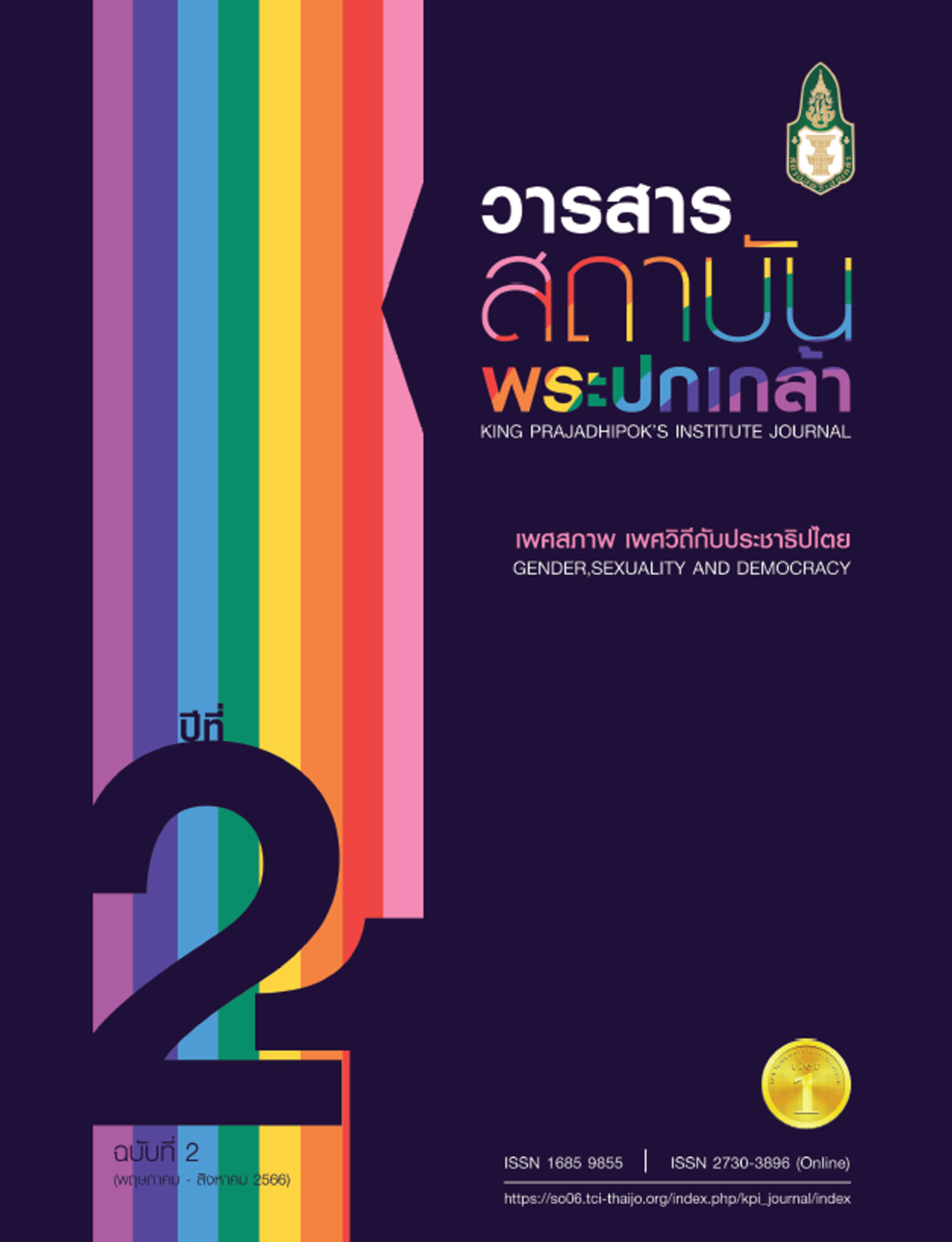Monitoring of Gender Equality Policy of Political Parties in National Thailand Election 2023
Main Article Content
Abstract
This article focuses on analyzing the gender equality policy and the potential of integrating the policy into the campaign of Thai political parties in the context of the 2023 election. The analysis contains the related factors to promote the policy and the deterioration of the gender equality policy in the context of the 2023 election. A concrete process to enable the gender equality policy requires research for relevant content while people in society are prepared to pursue the agenda in the political context. When discussing the policy related to genders, social perspectives, and traditions, there are various levels of perception among people of different ages. People in society must engage in discussion to lead to a mutual understanding. Since political transitions can alter the direction of the gender equality policy, the interaction between the "laws" and the "government policies" is examined to find the concrete factors to integrate all sectors into pursuing the policy continually and sustainably.
Article Details

This work is licensed under a Creative Commons Attribution-NonCommercial-NoDerivatives 4.0 International License.
@ 2020 King Prajadhipok's Institute The Government Complex Commemorating All Right Reserved.
References
ภาษาไทย
ชุณิภา เปิดโลกนิมิต, เกียรติศักดิ์ สุขเหลือง และบุญทัน ดอกไธสง. (2565). โมเดลความสัมพันธ์เชิงสาเหตุการขับเคลื่อนนโยบายด้านความเท่าเทียมทางเพศของกระทรวงการพัฒนาสังคมและความมั่นคงของมนุษย์. วารสาร มจร สังคมศาสตร์ปริทรรศน์, 11(4), R28-R39.
ฐานเศรษฐกิจ. (2566). กางนโยบายพรรคการเมือง ความเท่าเทียมทางเพศ. สืบค้นจาก https://www.thansettakij.com/thailand-elections/election-analysis/562937
ถวิลวดี บุรีกุล และคณะ. ( 2561). เสมอภาคสร้างได้ (การจัดทำงบประมาณที่คำนึงถึงมิติหญิงชาย Gender Responsive Budgeting: GRB). กรุงเทพฯ: สถาบันพระปกเกล้า.
ประกายกาวิล ศรีจินดา, สุรสิทธิ์ วิทยารัฐ และพิมพ์ลภัทร ชัยชนะ. (2562). กลุ่มไอดอล MUM48 กับการขับเคลื่อนความเสมอภาคทางเพศในประเทศอินเดีย. วารสารวิชาการมหาวิทยาลัยราชภัฏกาญจนบุรี, 8(1), 5-15.
พรรคก้าวไกล. (2566). 300 นโยบายเปลี่ยนประเทศ. สืบค้นจากhttps://election66.moveforwardparty.org/policy
พรรคชาติไทยพัฒนา. (2566 ). นโยบายด้านสังคม. สืบค้นจากhttps://www.chartthaipattana.or.th/policy/social
พรรคไทยสร้างไทย. (2566). โครงสร้างนโยบาย สร้างโอกาสและความสุข. สืบค้นจากhttps://thaisangthai.org/party-policies/sang-3-benefit/
พรรคพลังประชารัฐ. (2566). กระทรวงพัฒนาสังคมและความมั่นคงของมนุษย์. สืบค้นจาก https://pprp.or.th/service/education/
พรรคเพื่อไทย. (2566). นโยบายสิทธิสตรี. สืบค้นจากhttps://ptp.or.th/womens-rights
พรรครวมไทยสร้างชาติ. (2566). นโยบายพรรค. สืบค้น จากhttps://unitedthaination.or.th/%e0%b8%99%e0%b9%82%e0%b8%a2%e0%b8%9a%e0%b8%b2%e0%b8%a2/
รัฐบาลไทย. (2565). ปลัด พม. เสนอผลงานสร้างความเสมอภาคทางเพศท่ามกลามวิกฤตโควิด-19 ของไทย พร้อมจับมือสมาชิกสหประชาชาติมุ่งบรรลุ SDGs ในปี 2530. สืบค้นจากhttps://www.thaigov.go.th/news/contents/details/56685
อภิญญา ดิสสะมาน และชลัท ประเทืองรัตนา. (2564). สันติวัฒนธรรมในพรรคการเมืองเพื่อเสริมสร้างกระบวนการปรองดอง: กรณีศึกษาพรรคประชาธิปัตย์และพรรคเพื่อไทย. วารสารสันติศึกษาปริทรรศน์ มจร, 9(7), 3040-3051.
ภาษาอังกฤษ
Connell, R. W. (2001). Understanding Men: Gender Sociology and the New International Research on Masculinities. Social Thought & Research, 24(1/2), 13-31.


